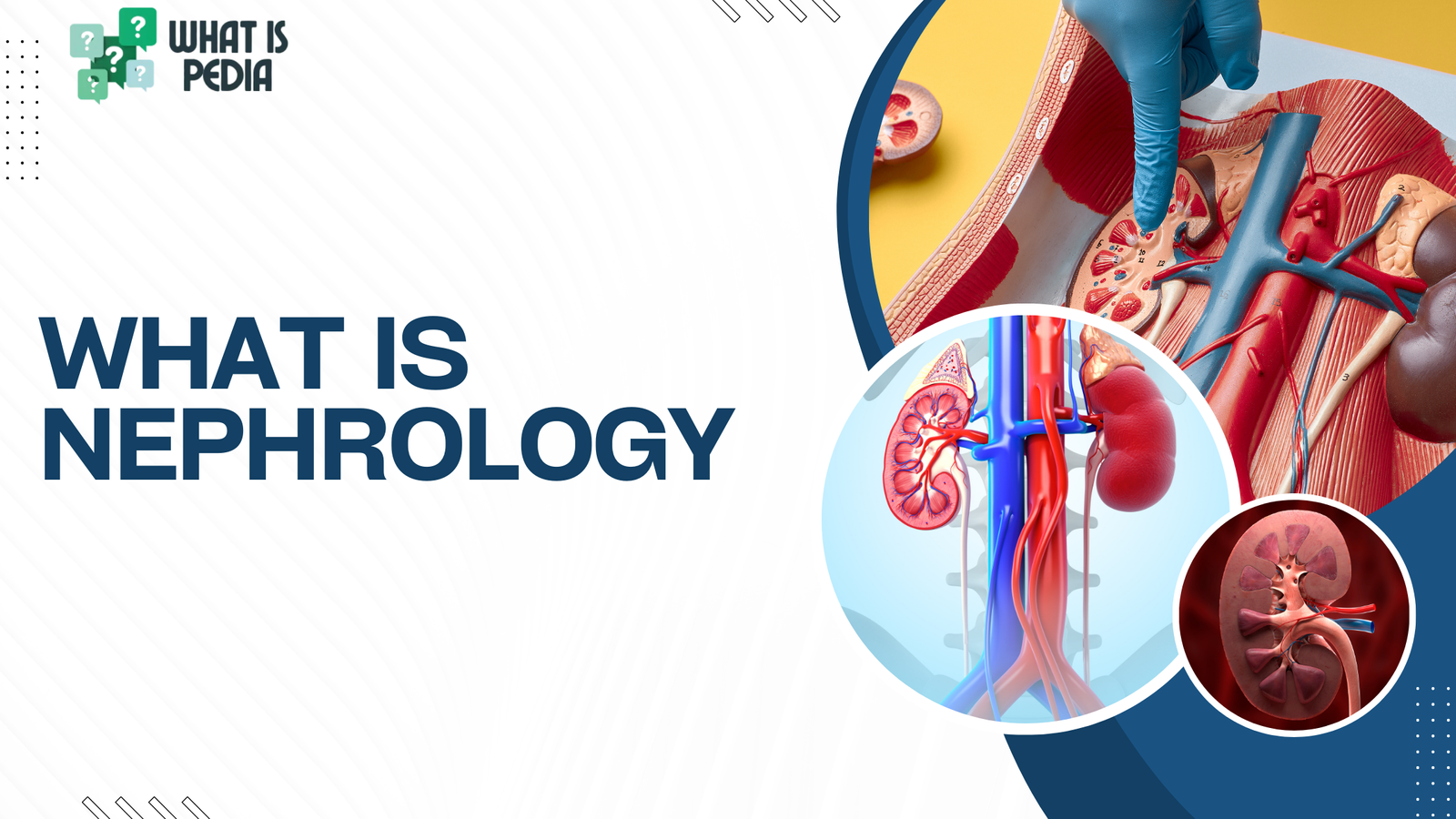The human body is a complex system where every organ plays a crucial role. Among these, the kidneys are vital yet often overlooked. They silently work around the clock, filtering waste, balancing electrolytes, and regulating blood pressure. When something goes wrong with the kidneys, the consequences can be life-threatening. This is where nephrology comes in.
Nephrology is the branch of internal medicine that focuses on the diagnosis and treatment of kidney-related diseases. From chronic kidney disease (CKD) to kidney stones, dialysis, and transplants, nephrology covers it all. In this blog, we’ll explore what nephrology is, its importance, the conditions it addresses, diagnostic methods, treatments, and preventive care tips.
Understanding Nephrology
The term “nephrology” comes from the Greek word “nephros” meaning kidney and “logy” meaning study. It is a subspecialty of internal medicine that deals specifically with kidney function and kidney diseases. A physician specializing in this field is known as a nephrologist.
Unlike urologists, who focus on surgical and structural issues of the urinary tract, nephrologists primarily deal with medical (non-surgical) management of kidney conditions. They focus on preserving kidney function and preventing the progression of kidney disease.
Why Are Kidneys So Important?
To understand nephrology, it’s essential to know the vital role kidneys play in our health. Located on either side of the spine, kidneys perform several functions, including:
-
Filtering Waste – Kidneys filter toxins and waste products from the blood to form urine.
-
Balancing Fluids and Electrolytes – They regulate sodium, potassium, calcium, and phosphate levels in the body.
-
Controlling Blood Pressure – Kidneys produce renin, a hormone that helps regulate blood pressure.
-
Producing Hormones – They produce erythropoietin, which stimulates red blood cell production.
-
Regulating Acid-Base Balance – Kidneys maintain the right pH level in the body.
If the kidneys fail to function properly, it can lead to waste buildup, electrolyte imbalance, anemia, hypertension, bone disorders, and eventually organ failure.
Conditions Managed in Nephrology
Nephrology covers a wide spectrum of kidney-related disorders. Some common conditions include:
1. Chronic Kidney Disease (CKD)
CKD is a progressive condition where kidney function gradually declines. It is often caused by diabetes, hypertension, or genetic factors. If left untreated, CKD can lead to end-stage renal disease (ESRD), requiring dialysis or kidney transplantation.
2. Acute Kidney Injury (AKI)
Unlike CKD, AKI is a sudden decline in kidney function, often triggered by dehydration, infections, medications, or trauma. With timely treatment, kidney function can often be restored.
3. Glomerulonephritis
This is the inflammation of the glomeruli—the tiny filters in the kidney. It can be caused by infections, autoimmune diseases, or other systemic conditions.
4. Kidney Stones
Hard deposits of minerals and salts can form in the kidneys, causing severe pain, urinary blockages, and infections.
5. Polycystic Kidney Disease (PKD)
A genetic condition where multiple fluid-filled cysts grow in the kidneys, impairing their function over time.
6. Hypertension and Kidney Disease
High blood pressure can damage blood vessels in the kidneys, while kidney dysfunction can also cause secondary hypertension, creating a dangerous cycle.
7. Electrolyte Disorders
Nephrologists treat conditions like hyperkalemia (high potassium), hyponatremia (low sodium), and metabolic acidosis.
8. Kidney Infections (Pyelonephritis)
A bacterial infection that starts in the urinary tract and spreads to the kidneys, requiring prompt treatment.
9. End-Stage Renal Disease (ESRD)
The final stage of chronic kidney disease where the kidneys lose nearly all function. Dialysis or transplant becomes necessary.
Role of a Nephrologist
A nephrologist is an expert in kidney care who helps diagnose and manage both common and complex kidney issues. Their roles include:
-
Evaluating kidney function through lab tests.
-
Managing patients with chronic kidney disease.
-
Prescribing medications to control blood pressure, blood sugar, and anemia.
-
Overseeing dialysis treatments.
-
Coordinating kidney transplants along with surgeons.
-
Advising on lifestyle and dietary changes to protect kidney health.
Diagnostic Methods in Nephrology
Early detection is critical in preventing kidney damage. Nephrologists use several diagnostic tools, including:
-
Blood Tests
-
Serum Creatinine
-
Blood Urea Nitrogen (BUN)
-
Estimated Glomerular Filtration Rate (eGFR)
-
-
Urine Tests
-
Urinalysis (checks for protein, blood, infection)
-
24-hour urine collection (measures kidney output)
-
-
Imaging Tests
-
Ultrasound
-
CT Scan
-
MRI
-
-
Kidney Biopsy
-
A small sample of kidney tissue is taken for microscopic examination to diagnose complex conditions.
-
Treatment Options in Nephrology
The treatment plan depends on the severity and type of kidney disease. Common approaches include:
1. Medications
-
Blood pressure medicines (ACE inhibitors, ARBs).
-
Diuretics to remove excess fluid.
-
Erythropoietin injections for anemia.
-
Phosphate binders to control mineral balance.
2. Lifestyle Modifications
-
Low-salt, kidney-friendly diet.
-
Controlling blood sugar and blood pressure.
-
Avoiding overuse of painkillers and antibiotics.
-
Staying hydrated.
3. Dialysis
When kidney function drops below 10-15%, dialysis is required to filter blood artificially.
-
Hemodialysis – Blood is filtered using a machine.
-
Peritoneal Dialysis – The abdominal lining acts as a filter.
4. Kidney Transplant
For end-stage kidney failure, a transplant offers the best long-term outcome. The diseased kidney is replaced with a healthy donor kidney.
Preventing Kidney Disease
While some kidney conditions are genetic, many are preventable through lifestyle measures. Here are some tips for kidney health:
-
Control Blood Pressure – Aim for less than 120/80 mmHg.
-
Manage Blood Sugar – Diabetes is the leading cause of kidney disease.
-
Stay Hydrated – Drink adequate water unless advised otherwise.
-
Eat a Kidney-Friendly Diet – Limit salt, processed foods, and excess protein.
-
Avoid Smoking and Alcohol – Both can worsen kidney damage.
-
Limit Painkillers – Overuse of NSAIDs can harm kidneys.
-
Regular Checkups – Especially if you have risk factors like hypertension, diabetes, or family history of kidney disease.
Importance of Nephrology in Healthcare
Nephrology plays a crucial role in preventing complications that could lead to heart disease, stroke, or even premature death. Since kidney disease often progresses silently without symptoms until advanced stages, nephrologists are key in identifying risks early and slowing progression.
Moreover, with the rising incidence of diabetes and hypertension worldwide, the demand for nephrology care is increasing rapidly. Public awareness about kidney health is essential to reduce the burden of kidney diseases.
Conclusion
Nephrology is a vital branch of medicine dedicated to maintaining kidney health and treating kidney diseases. From early detection and lifestyle management to advanced treatments like dialysis and transplantation, nephrology covers every aspect of kidney care.
Your kidneys may be small, but their role in sustaining life is massive. By understanding nephrology and prioritizing kidney health, you can prevent complications and live a healthier, longer life.
Curious about dental solutions too? Learn more in our detailed guide on what is a flipper tooth







